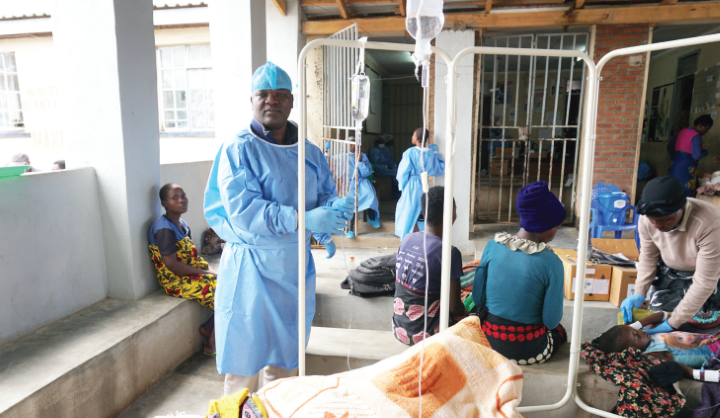Medical assistants, clinicians shortage frustrates patients
With the shortage of medical assistants at 75 percent and that of clinicians at 55 percent, many patients face frustration in their quest to access treatment in the country’s health centres.
The Physicians Assistants Union of Malawi (Paum) confirmed the development, saying this has caused many facilities to operate without either medical assistants or clinicians.

According to Paum—a trade union for clinicians, optometry therapists and medical assistants, the standard procedure is that each health facility should have two medical assistants and two clinicians.
Paum argued that the situation is so dire because in some cases health surveillance assistants (HSAs) are forced to run health centres.
Nation on Sunday’s investigation revealed that some patients return home without accessing treatment at health facilities.
Nicholas Gawani, from Kunenekude in Mwanza, returned home on Tuesday after failing to access treatment at Kunenekude Health Centre in the district.
He said: “I spent the whole day waiting to be helped, but to no avail. Clinicians and medical assistants could not cope with the numbers of patients they were expected to see. Since they were few, they were taking a long time to help patients.”
Gawani went home without treatment and when he returned the following day, he also found long queues.
This prompted him to travel to Mwanza District Hospital for treatment, a distance of over 20 kilometres from Kunenekude.
Gawani described the situation as frustrating, saying many people are failing to health services in their areas.
Grant Nhlema, from Ndirande Township in Blantyre, shared a similar story.
He said that he spent the whole day at Ndirande Health Centre to access health services.
“I took more than four hours to be attended to, due to lack of medical officers. If I had transport fare, I would have gone to Queen Elizabeth Central Hospital,” said Nhlema.
The frustration of the duo mirrors the situation in many health centres where patients wait for a long time to be assisted due to inadequate clinicians and medical assistants.
Thelma Nankwawa faced a similar situation at Lambulira Health Centre in Zomba.
Unlike the others, Nankwawa opted to buy painkillers at a pharmacy.
Due to lack of understanding, some clinicians are beaten by patients and guardians, thinking they are either incompetent or deliberately delaying treatment.
Paum president Solomon David Chomba said their findings show that one medical assistant manages a health centre with a catchment area of over 40 000 people.
He said: “This does not give them time to rest, do professional and personal development programmes. In fact, it causes burnout, resulting in mental health problems.
“Due to shortages, some patients think clinicians and medical assistants are deliberately delaying treatment and they end up beating them up.”
Meanwhile, Paum has since submitted its concerns to the Health Service Commission in which they proposed that each health facility should, at least, have two or three clinicians, including medical assistants.
Reads part of the submissions: “Inadequate recruitment of clinicians is rendering over 550 duly qualified clinicians loitering around at the expense of critical shortage, especially in health centres where one clinician manages the entire health facility 24/7 in 365 days.”
In its submission, Paum has suggested recruitment of clinicians currently on internship in the country’s health facilities.
The union submission also observes delayed promotions for over 300 clinicians stagnated on one grade for over four years despite the Malawi Public Service Regulations (MPSR) requiring them to move every four years.
According to Paum’s analysis, 46 percent of the clinicians are stuck on grade HK, 20.6 percent on grade HJ and 10 percent on P5. The analysis further indicates that 51.3 percent of the clinicians have never attended any promotion interviews and that 48.7 percent were interviewed but never got any offer.
“An analysis must be made to identify and promote all deserving clinicians to their expected promotion posts,” Paum states in its submission.
Apart from the recruitment and promotion issue, Paum has also decried the lack of communication from the Health Service Commission on critical issues affecting them.
Paum is part of the national task force mandated to champion the delinking of the Health Service Commission from mainstream civil service; hence, the submissions.
Health activists have since asked the Ministry of Health to address the concerns raised by Paum since health centres as first call for medical treatment for the majority of Malawians.
Health and Rights Education Programme executive director Maziko Matemba described the situation as a wake-up for the government.
“The government should recruit clinicians to meet the increasing demand for health services at facility levels,” he said.
Matemba added that ministries of Health and Local Government should discuss the matter and find lasting solutions despite the current economic challenges the country is facing.
Malawi Health Equity Network executive director George Jobe said lack of clinicians and other medical cadres exert pressure on the few that are available and compromise the quality of health services.
He said: “This causes some to seek services from unlicensed practitioners; hence, the need to recruit more healthcare workers for more quality, responsive and accessible healthcare services.”
Jobe also urged the government to recruit more optometry and orthopaedic technicians who completed their studies, but they are yet to be employed.
Ministry of Health Principal Secretary Dr Samson Mndolo and spokesperson Adrian Chikumbe agreed seeing Paum concerns, but were yet to respond to our questionnaire.






One Comment